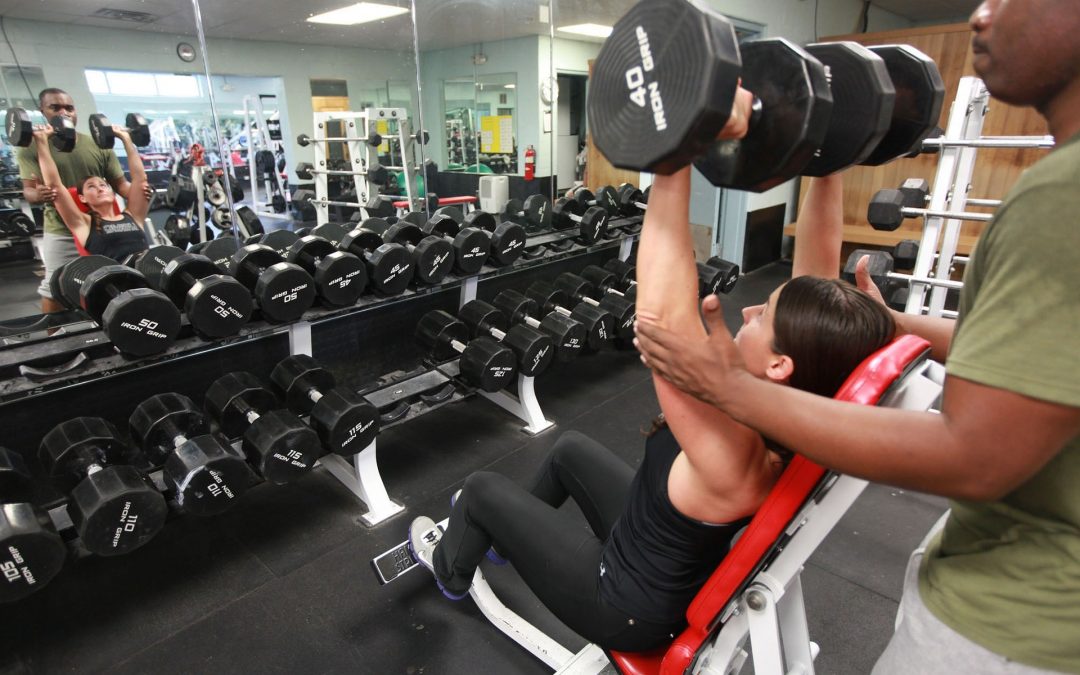When weight training, we often see that people don’t train alone. Instead, there are people who assist those who are bench pressing or lifting quite heavily. These people are called spotters. Like other sports and activities, spotters are those who help and support a trainer when weight lifting. Usually, their roles are to be able to help a trainer should anything go wrong, or assist them in lifting, especially if a trainer cannot complete a lift. Everyone, no matter how experienced works or have started out working with spotters and some even still work with them.
That being said, it’s also important to find a good spotter to rely on and trust. While spotters are usually also personal trainers that work at your gym, it can also be anyone you trust and has experience lifting as well, like a friend. By working with the same person, over time, you’ll both learn what the other may want and need, when to intervene and when to stand back. Spotters can also be essential to the effectiveness of a workout.
There are plenty of reasons that spotters are completely necessary when weightlifting.
Ensuring Proper Technique and Form
Weight lifting is dependent primarily on your technique. Incorrect technique can be extremely harmful to weight lifters and can cause serious injuries. It’s a spotter’s duty to help another trainer with this, since they can observe and ensure that the lifting being done is being executed properly. Sometimes the assist is needed to take full advantage of the range of motion required for the lifting you’re about to do. Weight training also requires the maintenance of form and control of movements. This can prove to be difficult when rushing or the body is tired. Spotters can help improve or correct this.
Protection from Dropping Weights
One of the most common injuries when weight lifting is from dropping the weights. Trainers who attempt to lift a heavier load than what they’re used to can risk dropping the weights out of exhaustion. Weights can fall on the trainer and lead to severe injuries. Weight dropping or re-racking weights can also damage these equipment. Having a spotter can prevent you from dropping these weights, saving you from potential injury and saving the hassle of damaging any equipment.
Protection from Straining Yourself
Spotters can also help weightlifters by preventing any injuries from strained muscles. Weightlifters who attempt to lift more than their normal load can and will often end up experiencing injuries due to strain. Spotters can help you lift the weights off you if you can no longer carry the load. This is important when training because serious injuries will take longer to heal, therefore slow down the process of further training.
Improvement
Working with a spotter you trust and listen to can really help improve your overall performance. A spotter can easily see when you’re doing movements or forms that are incorrect, can help you lift weights that you’re having significant trouble lifting, and see how much you’ve progressed later on. They can even give you a confidence boost and be the safety net you fall back on when you need to lift more challenging weights or try new exercises.
Increased Workload
Working with a spotter can be essential when you’re almost at the point of exhaustion and don’t want to do an extra rep or two. Nearing the end of a set, a trainer can really feel the challenge as the muscles are tired. A spotter can help you keep going and be there to assist you if you can no longer meet the challenge, or help you meet it in a safer way. You don’t sell yourself short and do a short cut to finish your workout, to rush your workout and to neglect your form. A spotter is there to help keep you accountable. It’s just like being in a partnership.
Claims of possible placebo effect can even take place, as even just having a finger on the barbell can trick your mind into believing that there is someone there to assist you, making the load feel lighter and easier. This allows you to keep going, even if it’s only really you doing the work.
Once your body is used to lifting this way, you and your buddy can take turns spotting each other. Always remember that spotters are there to assist, but not do all the work. In fact, spotters shouldn’t intervene unless absolutely necessary, so as not to hinder the progress of the trainer. Remember that help at the gym doesn’t mean you’re not as strong, it means you’re determined to get strong. Strong people help strong people.


